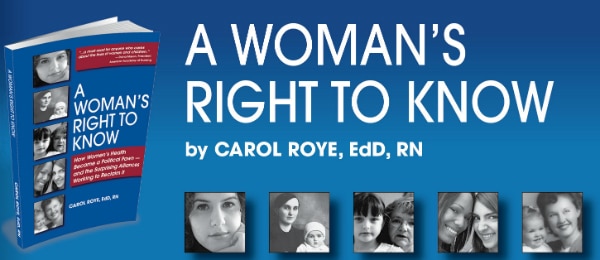When Did Women's Health Become a Divisive Political Issue Instead of a Private Medical One?

By Carol Roye, EdD, RN — May 29, 2014
While reading an American history book a number of years ago, I came across the statement that evangelical church leaders had not concerned themselves with women’s issues such as abortion until the mid-1970s. As long as women stayed out of the church hierarchy, the church was content to leave reproductive issues alone.
As a nurse practitioner who provides reproductive health care to young women, and knowing about the increasingly hard time women have accessing reproductive health care, largely due to the influence of conservative church teachings on public policy I was curious. Actually, I was more than curious; I was angry.
Could the religious dogma that we’re told is a longstanding part of Christian morality be a recent creation, with no historical origins?
That started me on a research journey that led to the writing of the book “A Woman’s Right To Know: How Women’s Health Became a Political Pawn — and the Surprising Alliances Working To Reclaim It” (Frances Price Enterprises, 2014).
My anger was deepened by my own clinical experiences with patients. Once, when I accompanied one of my adolescent patients for a follow-up procedure she needed due to an abnormal Pap smear (I knew she wouldn’t go alone), I looked around the waiting room and saw women there for colposcopy or abortions. They looked frightened. Some had sisters or friends with them. There was not one man in the room.
I realize that there is a biological inequity that women must live with. But there is no excuse for primarily male legislators making life harder for women. I was determined to understand the history and write about it from a nurse’s perspective.
Reproductive health, including abortion and contraception, is, to put it simply, health. Cancer of the uterus, cervix or ovaries is no less a problem than brain or prostate cancer. If a woman dies of a complication of pregnancy, she is no less dead than if she died of a heart attack. And, her children are no less motherless.
What most surprised me when researching this book was that there is no historical tenet in the evangelical and Southern Baptist Churches against abortion. In fact, their most basic and dearest tenet is separation of church and state. Evangelical scholars freely say that. They believe that they have the right to tell the people in their pews how to behave. But, they have no right to dictate to the country.
In fact, in the early 1970s, before the Roe v. Wade Supreme Court decision legalizing abortion, the Southern Baptist Convention advocated for legislation legalizing abortion in a number of circumstances, including “carefully ascertained evidence of the likelihood of damage to the emotional, mental, and physical health of the mother.”
This was clearly a pro-health action. Their stance changed over the years for reasons having to do with money and power.
The political activity of these groups began when they organized against an IRS decision rescinding tax-exempt status for racially segregated Christian academies. They raised a lot of money and gained some prominence. When that tax-exempt status was restored, they became, in essence, an army in search of a mission. Through a tangled series of events, opposing abortion became that mission. It allowed them to solicit funds for their political activism, and it eventually led them to the halls of power.
I was, however, heartened to find that there were and are many religious leaders who have led what I call the pro-health/pro-family movement by advocating for women to have access to all aspects of health care, including contraception and abortion.
In short, we have been sold a “bill of goods” about reasons for denying essential health care to women. “A Woman’s Right to Know” explains that history and the important intersection of reproductive health and public health. And, it suggests steps that readers can take to combat the harmful, misogynistic laws that are enacted on a regular basis in the United States.
Carol Roye is the author of “A Woman’s Right to Know,” a culmination of decades of experience and research into the history and impact of public policy decisions on women’s health, and a respected women’s health practitioner who serves one of New York City’s most impoverished neighborhoods.
